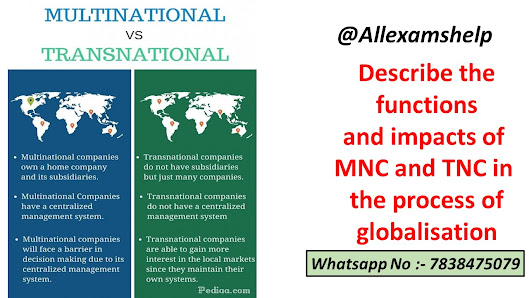MNC (Multinational Corporations) and TNC (Transnational Corporations) are powerful entities that play a significant role in the process of globalization. Here are their functions and impacts
Investment:
MNCs and TNCs invest in foreign countries to take advantage of lower labor
costs, natural resources, and other factors. This investment can help stimulate
economic growth in the host country.
Describe the functions
and impacts of MNC and TNC in the process of globalisation
Production:
MNCs and TNCs often set up production facilities in developing countries where
labor is cheaper. This can lead to increased production and exports from these
countries.
Technology
Transfer: MNCs and TNCs bring advanced technology and know-how to developing
countries, which can help improve local industries and increase productivity.
Employment:
MNCs and TNCs create job opportunities in developing countries, which can help
reduce unemployment and poverty.
Economic
Growth: MNCs and TNCs contribute to the growth of the global economy by
investing in foreign countries, creating jobs, and increasing trade.
Increased
Competition: MNCs and TNCs can create more competition in local markets, which
can have both positive and negative impacts. While increased competition can
lead to lower prices and better products, it can also put local businesses out
of business.
Exploitation:
MNCs and TNCs have been accused of exploiting workers in developing countries
by paying low wages, offering poor working conditions, and violating labor
laws.
Environmental
Impact: MNCs and TNCs can have a significant impact on the environment through
their production processes and waste management practices. They have been accused
of causing environmental degradation in developing countries.
Overall, MNCs
and TNCs have both positive and negative impacts on the process of
globalization. While they can help stimulate economic growth and create jobs,
they also have the potential to exploit workers and harm the environment. It is
important for governments to regulate the activities of MNCs and TNCs to ensure
that their impacts are positive and sustainable.
MNCs
(Multinational Corporations) and TNCs (Transnational Corporations) are both
types of corporations that operate in multiple countries, but there are some
differences between the two.
MNCs are
corporations that have a presence in multiple countries, but they are usually
centralized in their home country. They may have subsidiaries in other
countries, but their operations are still primarily directed by their home
country. In contrast, TNCs are corporations that have a decentralized
structure, with operations and decision-making spread across multiple
countries.
The functions
of MNCs and TNCs are similar in that they both aim to expand their business
operations and increase profits by investing in new markets and taking
advantage of economies of scale. They also create jobs in the countries where
they operate and can contribute to the development of infrastructure and
technology.
For SOLVED PDF & Handwritten
WhatsApp No :- 7838475019
However, there
are some negative impacts associated with MNCs and TNCs. For example, they may
exploit natural resources and labor in the countries where they operate,
leading to environmental degradation and poor working conditions for local
workers. They may also contribute to the concentration of wealth in the hands
of a few powerful corporations, which can have negative effects on the
economies of the countries where they operate.
In summary,
while MNCs and TNCs can bring benefits such as job creation and technological
development, they can also have negative impacts such as exploitation and
wealth concentration. It is important for governments and other stakeholders to
monitor and regulate the activities of these corporations to ensure that they
operate in a responsible and sustainable manner.
